For the ancients, osmanthus flowers were a peerless perfume that could be eaten.
[ Perfume ]
Osmanthus
Among the top ten famous flowers,
Just as osmanthus is special,
The most insignificant,
When he came, he swept the entire Jiangnan with "Autumn Fragrance".
There is a drop of gold on the tip of everyone's nose,
Sweet to the tip of my tongue,
Become a beam of light.
When Qi Baishi painted it, he had to gather a jade rabbit or a flat peach. When Pan Tianshou painted it, he had to write a long postscript. There are few such people, but there are many laypeople like me in the world. I think it is difficult and lonely. Why bother these people? If you put osmanthus cake in your mouth, it will feel relaxed and relaxed.
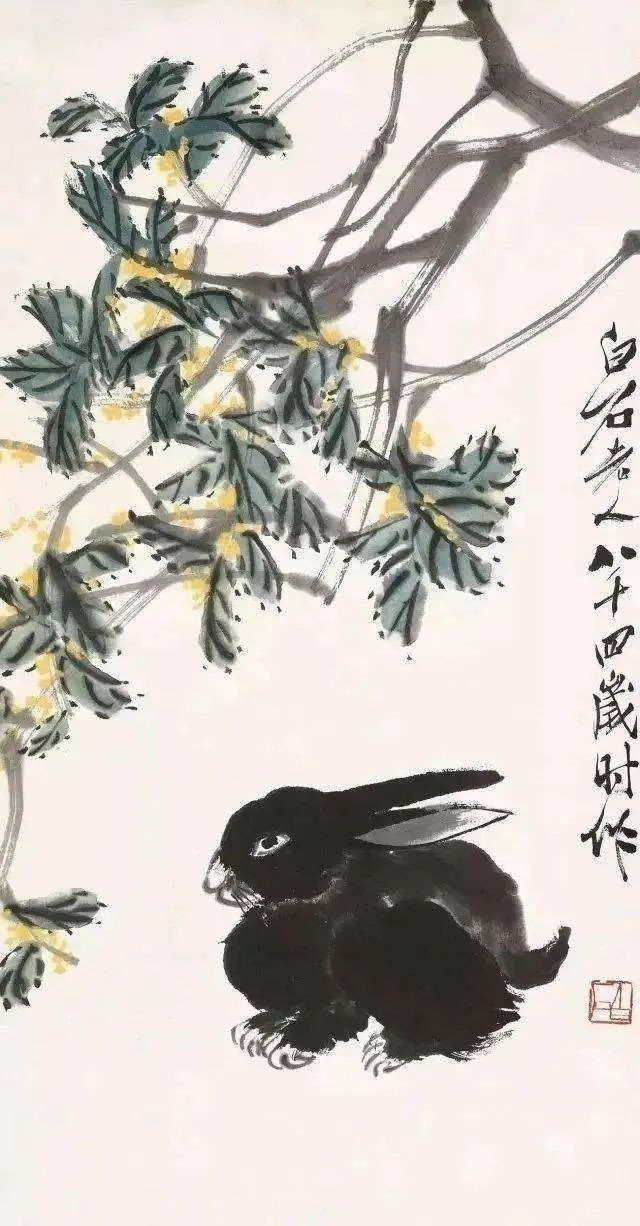

Min thought to himself that the fragrance of osmanthus flowers is really ordinary. This kind of mood is like a man taking a hard puff of smoke afterwards and laughing at himself at his confusion. It's just two pieces of meat. It is said that osmanthus smells special, but nowadays, most of those big-name perfumes are complex and profound "exotic scents". If the pure taste is without the conceptual words "boiled water flavor" and "sky flavor", it can only be defined by thinness and vulgarity. The rest are all one of the densely packed formulas at the bottom of the perfume bottle. They are insignificant. In the business world, there is a drop of something that tastes a little more than white water. Why bother people about what it is? "Fragrance of osmanthus" is even more accessible and cheap than any flower whose name cannot be understood.
Seeing osmanthus, I am no longer excited. However, without osmanthus, I will be lost. This is weird.
Just like seeing the news that "osmanthus came late to Hangzhou" filled the screen this year, when I saw the strip cake wrapped in plastic film on the farmers 'market stall when I was a child, I couldn't help but think, I want more osmanthus. Because grandma always said that osmanthus is good for children's eyes. Qing Dynasty Wang Shixiong's "Suixiju Diet Book" has a few short sentences,"Osmanthus is warm." Eliminate stench, wake up the stomach, and eliminate phlegm.Steaming the wine with dew, soaking the wine with salt and sugar, and making the filling. The taste is fragrant and beautiful. You can also steam tea oil to nourish your hair."Thousands of years of eating osmanthus are all in it, and it's so fragrant that I can't bear to let go.
People always love to forget those important smells of the past, but they will come up in their hearts with saliva.
Osmanthus scented tea
Whenever I mention osmanthus flowers, I can't help but droop my saliva. Speaking of eating osmanthus, there is a sweet and fragrant history of "making". Human sense of smell is a "long taste", while taste is a "short taste", achieving each other. A large part of the reason why the Song people achieved the peak of ancient cuisine was people's love for aroma at that time.
Deng Su, a native of the Song Dynasty, compared the aroma of osmanthus to ambergris. It was the saliva of dragons in the legends of the ancients. It was produced by the digestive system of sperm whales and was very rare. He wrote the poem "Muxiang":"When the breeze comes to the sky, the dragon saliva in the world does not dare to smell fragrant" to express his straight preference. Yang Wanli also provided evidence in "Burning Incense","Life is full of knowledge of the flavor of mountains and forests, but it is not because of the unique fragrance. I called my son to get the osmanthus, but I think the scholar is really rich." He also resolutely placed the world's most fragrant "dragon saliva" behind osmanthus.
Agarwood can be drunk, and the elegant ancients began to play high-end blending in tea, which is the "infernal affair" of tea ceremony and fragrance ceremony. Borneol, musk, and agarwood have been added to tea one after another, and "fragrant tea" has become a common practice. Although I have never drunk it, I still feel that it is so fragrant that I can't breathe. Of course, the stronger the aroma, the better. Indeed, osmanthus tea is much more cordial and pleasant in the mouth.
The ancients were still smart, gradually grasped the "sense of proportion" of scented tea, and figured out that "if there are too many flowers, it will be too fragrant, and if there are few flowers, it will be less fragrant, but it will not be beautiful." Three stops tea leaves, one stops flowers, and one starts to say." The Song Dynasty's "Diao Xie Lei Bian" detailed records the smoking method of fragrant tea taking "sweet clover" as an example: "For example, sweet clover flowers must be removed from their branches, dirt, insects and ants, and magnetic cans must be used. Layer of tea and flowers must be poured into the room until full, tie them with paper, put them into a pot and separate cans to boil, take them out to cool, wrap them with paper, and place them on fire to dry and collect them. All flowers imitate this." It can be seen that osmanthus tea is the originator of the technology of scenting tea.
In winter, when Hangzhou people entertain guests, they will always make a cup of osmanthus tea on the table. It is either Longjing osmanthus or Jiuqu Red Plum. Since the fragrance ceremony and tea ceremony have become "I am in you, and I am in you", it seems that in modern times, drinking a cup of osmanthus tea is a reasonable standard operation. Hold on! The ancients cast their eyes at history. In the world of the ancients, it was vulgar!
Ancient literati said that "they can't see the flower shape and only smell the fragrance of flowers to be high-class."
One of the special hobbies of literati in the Ming and Qing Dynasties was "building courtyards." Previously, the famous Qi Baishi and Pan Tianshou whom I mentioned were both destined to have the same garden. They both used the "Mustard Seed Garden Painting Manual" as their "enlightenment" back then. The "mustard seed garden", where you can see the flowers of the four seasons from sitting on the ground, is now deserted among the weeds. It is the house of the literary hero Li Yu. When Li Yu relied on people to build the park, he said that "there are not enough to build three caves, but only one hill can be built." Therefore, he called it a "mustard seed garden", describing it as small. This mustard seed garden is not only a place where Li Yu banquets, writes dramas, calligraphy and paintings, but also a place where he prints and sells books. Back then, popular books such as "Water Margin","The Romance of the Three Kingdoms","Journey to the West", and "Jin Ping Mei" were all under his promotion. It was only when he became famous. "Although the mustard seed is small, it is beautiful." Presumably, no matter how young they were, they still had osmanthus.
However, it is not easy to enjoy the shade under the osmanthus bushes in the whole world. Make a cup of sweet clover and sesame smoked bamboo shoots in "Jin Ping Mei" to make tea, or make tea with eight-treasure green beans and sweet clover? That's no way! Zhang Dai, a famous scholar at the end of the Ming Dynasty and the beginning of the Qing Dynasty, records a osmanthus tree behind Zhu Wenyi's official residence. It vaguely demonstrated its heinous ability to "make" and said that the tree was actually quite big."It is as big as a bucket, with branches and leaves, and a shade of acres. It can accommodate thirty to forty guests." However, the owner did not create a viewing point."No pavilions, no houses, no platforms, no fences, no building, and only abandoned fences." Moreover, idle people and themselves are not allowed to enter."No one is allowed to enter during the flower time, and the master is also forbidden to go. Listen to them and thank themselves." This attitude is like treating osmanthus as a fragrance during meditation, promoting the same world between heaven and nature. In the minds of the ancients, there was also a sweet-scented osmanthus tree in the sky. According to legend, it was five hundred feet tall and grew fast. It would not be able to accommodate it without cutting down the palace. The Jade Emperor asked Wu Gang, who had made a mistake while cultivating cultivation, to chop it every day, but while cutting it together, it could never be cut off, implying the nothingness and eternity of Zen.
Zhang Dai has been a fan of Hangzhou for a long time. In Hangzhou, I can understand this kind of "Zen". Scholars have had many interactions with monks here since ancient times. The trend of retaining the fragrance of osmanthus flowers was theoretically brought about by monks in Hangzhou. In Volume 18 of Wu Zimu's "Mengliang Lu" of the Song Dynasty, it is recorded that around the "Shangxiang Ancient Road", it is actually the main producing area of osmanthus trees."Mujia, there are red, yellow and white ones, which are very fragrant and rhyming. There are many Tianzhu Mountains in Qinghai, and there are dozens of trees in Changqiao Qingyuan. Scholars have tried to enjoy this strange fragrance."
In fact, Wen Zhenheng, an aesthetician of the Ming Dynasty, had long talked about the way to open up the appreciation of osmanthus. He was a little more than Zhang Dai's entry into the world: when the osmanthus trees were opened, it was really called the "Fragrant Cave". Two acres of land should be opened, and all kinds of land should be planted together. If you plant it together, you should not use words such as "Tianxiang" or "Xiaoshan", let alone mix it with other trees. The ground under the tree is as flat as the palm of your hand, clean as it cannot sleep. When the flowers fall to the ground, they will be taken as food. What does that mean? Osmanthus flowers are suitable for enjoying them with your eyes closed and your mouth open. You are not allowed to enter and don't attract others 'attention!
We no longer care if this cup of Internet celebrity osmanthus latte in front of us is a scattered osmanthus that has been sprayed with pesticides in the park. As long as we pose and take a photo, it will be over autumn. But our Jiangnan ancestors not only wanted a clean bite, but also love and awe, so that the osmanthus in their hearts would be fragrant.
Guangxi wine and osmanthus wine
The definition of "Gui" in ancient books is relatively vague. The word "Gui" can refer to laurel of the Lauraceae family or sweet-scented osmanthus of the Meliloticus family. However, everyone who makes wine knows that osmanthus wine is delicious. Although I don't drink much, I can't get tired of sweet wine brewed with osmanthus when I was a child. Even when I grew up, I could eat red cheeks and blurred eyes just by eating glutinous rice dumplings brewed with osmanthus wine.
People in the Song Dynasty did not like "clouds and flowers on the temples and golden steps, and hibiscus tents warmed the spring night." Li Shimin, Taizong of the Tang Dynasty, liked fat women. The aesthetics of the Song people were like a thin-mouthed plum vase, much more delicate than that of the Imperial Consort Yang.
The beauty of smelling the fragrance and recognizing a woman lies in the right amount of fainting, reaching a secluded place, and achieving "harmony between man and nature". Of course, scented tea is not enough to faint, you have to drink flower wine!
In order to create "the artistic conception of making mistakes in the flower field", the people of the Song Dynasty emphasized that there should also be fragrance in the bed tent where they slept, so they had such high-end decoration as bottle flowers beside the pillow. Autumn is sweet clover. At that time, the poet Huang Geng described it as "the fragrance penetrates through the poet's bones, and the autumn dream is immortal when you sleep halfway through the bed." "Xiangxiang in the tent" is not only a flower arrangement. After the fresh flower season, dried osmanthus can be used on an elegant and fragrant winter night. Zhu Dunru, a native of the Song Dynasty, said in his poem "Bodhisattva Man·Autumn Wind Green on Banana Leaves": Autumn Wind Green on Banana Leaves. It's raining in the evening and the tassel is wet. The new scent of sweet clover is deep. The fragrance is late and the tent is deep. At this time,"sweating is dripping with fragrance", which is also suitable for the occasion.
Han Xizai in the Southern Tang Dynasty was the male protagonist of "Han Xizai's Night Banquet" with half-naked breasts and messy wives and concubines. It was even more outrageous! There has long been a saying that "there are five advantages for burning incense on flowers":"When burning incense on flowers, different flowers have different fragrance." He was also the one who invented the shameless operation of "burning incense on flowers" when drinking flower wine. He believes that when combined with the blooming sweet clover in autumn, and adding beautiful women to get drunk, it will have a wonderful effect. The Southern Song Dynasty male edition Li Ziqi-Lin Hong reveals this same sentiment: "The bold bottle is clear and the poetry is lively, and the fragrance of the ancient tripod is faint with the fragrance of wine." When drinking and having fun, osmanthus flowers are placed in the vase, and the incense burner must also be burned with the fragrance of osmanthus flowers.
However, osmanthus wine was not invented by them. osmanthus wine was drunk by the ancients as early as the Spring and Autumn Period and the Warring States Period. Qu Yuan said in "Nine Songs":"The dishes are steamed and orchids are borrowed, and the cinnamon wine is served with pepper paste. "The osmanthus wine used in this priest ceremony is osmanthus wine brewed from osmanthus. In ancient times, it was also called osmanthus sugar, osmanthus vinegar, osmanthus syrup, etc. Kong Pingzhong's "Tan Yuan" said: "Cinnamomum syrup is probably the current method of making osmanthus. In the Wei Dynasty, people from Pinsi came to the court, and there was syrup in the pot like fat. It was cinnamon syrup, and it lasted for thousands of years."
Su Shi, who loves Hangzhou, has "Ode to Gui Wine". The ancients believed that Gui was the best of all medicines and could indeed strengthen the body. Therefore, the wine brewed with osmanthus can be "drunk for thousands of years." According to "Four People's Moon Today", osmanthus wine in the Han Dynasty was a good choice for people to worship gods and ancestors. After the priest finished, the younger generation toasted to their elders and sent blessings for longevity.
Osmanthus wine has gradually evolved from being a shrine and respecting the elderly to becoming a social wine for people's banquets. "Han Shu. Li Yue Zhi said: "Respect Gui wine, guests in Baxiang." Many feudal emperors also rewarded osmanthus wine as a gift to ministers. Scholars and officials of all dynasties have also praised osmanthus wine. Bai Juyi once wrote a poem to praise osmanthus wine,"The thread is not fragrant, the red cherry is colorless and the waves are fine." In the Song Dynasty, sweet-scented osmanthus gradually felt like a "national flower". This attracted a light red color from Zhao Gou's "Inscription of Dangui Painting Fan and Giving to Consort Officials","The Moon Palace was moved to the Sun Palace." I can bear the rain and dew in the smoke and sky, and my heart will be open to you one by one." You can feel it. Xin Qiji sang praises for "spreading the fragrance of education in the world", which seemed to imply his ambition to "achieve success and benefit the world".
The national wine in ancient times was not Maotai, but perhaps Guangxi wine.
Osmanthus perfume that you can drink
In ancient times, not only medicine and food were homologous, but also the aroma of medicine and food was homologous.
Because of the saying "aroma removes dampness and the epidemic", there is also the osmanthus's own "soothing the liver and regulating qi, awakening the spleen and removing dirt, improving the eyesight, and moistening the throat." The ancients were very obsessed with the efficacy of osmanthus fragrance. Xu Yang's "The Prosperity of Suzhou" There is a tea shop next to the Mudu Sinking Bridge, with the sign of "Osmanthus Dew" hanging.
It is reasonable for Jia Baoyu to drink osmanthus perfume to nourish his body. Back in time and space in the 34th chapter of "Dream of the Red Chamber", Baoyu was beaten, and Lady Wang asked her servant girl Xiren to bring Baoyu two bottles of "fragrant dew." "When Xiren looked at it, she saw two small glass bottles that were three inches in size, with screws and silver caps on them. The goose-yellow note read" Muliu Qinglu "and the other one read" Rose Qinglu." Xiren smiled and said,"What a noble thing! How many bottles can there be?" Mrs. Wang said: "That's for entry. Don't you see the yellow paper? Keep it well for him and don't waste it."
On ancient Valentine's Day, I'm afraid girls loved osmanthus more. The famous recipe of the Qing Dynasty,"Diao Ding Ji", mentioned that roses and osmanthus "are smashed without the juice but the fragrance will not dissipate, but other flowers cannot be eaten." Before the ancient Chinese did not know that roses represented love, the status of osmanthus was as high as the sun! "Dream Liang Lu" clearly records that every summer and autumn, in the night market in Lin 'an,"Olive Fragrant Juzhu" is always one of the hot items provided by mobile vendors at any time.
And the "osmanthus dew" came from Qin Huaqi woman Rugao celebrity Dong Xiaowan. When she was 17 years old, she wrote "Eleven Seven-Character Poems in Autumn Guesthouse" in Xiaojie: "It is the best thing to cherish the autumn and the fragrance of drinking under the sweet-scented osmanthus branches." I knew her fascination with this fragrance.
The Qing Dynasty's "Memory of Yingmei Temple" records in detail Dong Xiaowan's recipe for making flower sugar dew: "Brewing the syrup into dew, mix with salt plum, and all colored fragrant stamens are picked and stained when they are first released. The fragrance and color remain unchanged over the years, and it is as red as picking. When the flower juice melts into the liquid dew, it will spray into the nose at the entrance. It has a strange fragrance and will not last forever." Her fresh flower syrup is the method of osmanthus sauce, which is consistent with the statement in "Diao Ding Ji". It starts from picking green plum in April and May of the new year, removing the cores, mashing and marinating to make "plum sauce", and until the autumn osmanthus blooms, cleaning and marinating, and takes a year to have this fairy aura.
Traditional osmanthus cake
Nowadays, if children in Hangzhou have a pious gene, they will go to Lingyin Temple to make incense in the early morning of important exams, then eat a "Dingsheng Cake" and "settle" their hearts, and then press on a "No. 1 Champion Cake" to stabilize them. In fact, in the past, everyone ate "osmanthus cake" to get lucky.
Osmanthus cake is recorded in Lin Hong's "Shanjia Qing Gong" in the Southern Song Dynasty. It is called "Guanghan Cake"."Picking Gui Ying to remove the green stalks, sprinkle with licorice water, and mix it with rice flour to make a cake. The scholars and friends of the past year made cakes and fed them to gain the knowledge of Guanghan and Gaojia."
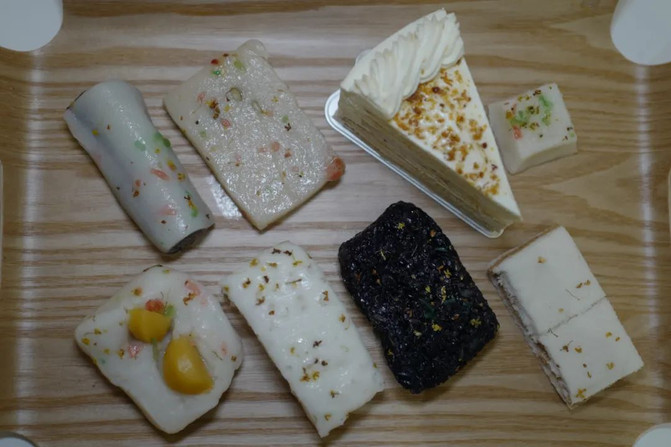
My mother likes to buy me all kinds of osmanthus cakes. The first time I took me to "Tianxiang Building", this time-honored brand that started cooking Hangbang cuisine in 1927 was originally named Wujin Tianxiang Building. I still looked ignorant and didn't have the arrogance of a so-called food critic with a slightly crooked mouth. When I first ate osmanthus rice cake, the soft white body stretched out in my mouth. The elasticity could only appear on jujitsu athletes. While holding back the boiling "body temperature" between my fingers and mouth, I stretched the athlete's "white and fat arm", which almost shook.
Osmanthus rice cake is alive. The soul of the sugar osmanthus made the osmanthus rice cake grow wings and fly directly into my little heart. It has always been in it, so unforgettable. If I wasn't in kindergarten, I would not have discovered the five laws of "Lingyin Temple" by the poet of the Tang Dynasty and Song Dynasty at that time: "The moon sets, and the fragrance of fragrance flies outside." The word "fragrance of fragrance" can just describe this state of mind. Later, there was a "Tianxiang Building" in Taiwan. Perhaps it was because osmanthus sugar was not easy to obtain, and the wine dumplings had changed from osmanthus aroma to orange aroma. But in Hangzhou, things are no longer the same. But every time I pass by, I still get excited.
The steps of traditional Jiangnan pickling sweet-scented osmanthus sugar are actually a bit like Jiangnan farmhouse pickling pickles, except that the "salt" is more advanced, using plum stew. Osmanthus osmanthus and plum brine are kneaded and mixed together, covering a layer of palm leaves and a layer of bamboo strips, pressing heavy stones on them, and sealing them for a month or two to ferment. Then take out the osmanthus osmanthus, wash off the plum gravy and rinse it, drain the water, pour the osmanthus into white sugar, and use a pestle and mortar to mash it into a yellow-brown sugar paste. There is no osmanthus, only the aroma can be smelled. Dried and sealed in lime jars.
How could the ancients who soaked flowers into sweetness not love osmanthus cakes?
In ancient times,"osmanthus sugar" was used exquisitely, but in modern times, the complexity has been simplified. The most spices used in Hangzhou Cake Group snacks are simply pickled "dried osmanthus". When I was a child, cake cake pie vendors in the farmers 'market also liked to inquire about Jiangnanchun, a sixty-three-year-old Hangzhou pastry shop, to buy goods. Many Hangzhou people used this glutinous cake pie with childhood memories for breakfast. Its family's concept is exactly the same as the practice of fat cakes in Yuan Mei's "Suiyuan Food List" in the Qing Dynasty: "Mix the fat with pure waxy flour, steam it on a plate, add rock sugar, and smash it into pieces, add it into the flour, steam it and use a knife to cut it.", Just each has its own ingredients. Tiaotou Cake, Tricolor Cake, Wumi Cake, and limited edition Chongyang Cake are still popular items for a long time. However, the ancient flavors of honey cakes and mint cakes will still make many elderly people unable to give up. The "Tiaotou Cake" of Hangzhou's time-honored brand "Zhiweiguan" is filled with fine bean paste, while Jiangnan Spring is filled with bean paste and sesame seeds, but the outer layer is decorated with osmanthus. In addition, Yujiuxuan, which has been in business for at least 20 years, the wet aroma of osmanthus wine from the osmanthus cake and the dry aroma of osmanthus nuts from the osmanthus cake are the gentle and double evils of many people on the road to weight loss.
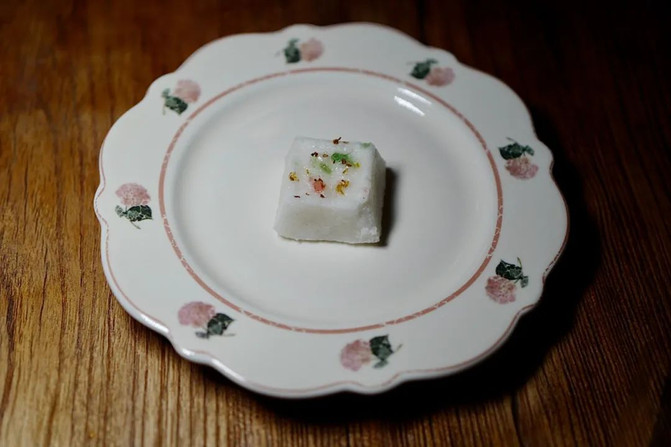
Name: Mint Cake
Brand: Yujiuxuan·Jiangnan Pastry
The elderly prefer this one. It is a small piece. The osmanthus on it echoes the fragrance of osmanthus in the nine-song red plum blossoms in winter. Mint is something that can relieve sweetness. Moreover, when encountering hot tea in Jiangnan, sometimes you need to take a sip of this tea cake to relieve it.

Name: Tiaotou Cake
Ingredients list: rice flour, sugar, bean paste
Brand: Jiangnan Chun
The tiaotou cake is quite light in sweetness. It is filled with red bean paste, sesame seeds and glutinous rice. When I was a child, there was also a version of pure bean paste, which was also very delicious.
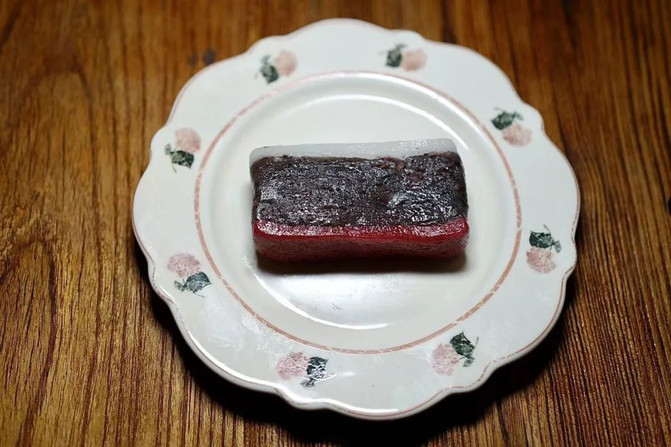
Name: Three-color cake
Ingredients list: rice flour, sugar, bean paste, red yeast powder, osmanthus osmanthus
Brand: Jiangnan Chun
This three-color cake was my favorite glutinous cake when I was a child. In the middle part, the rice flour is actually filled with red bean paste and a little sesame seed to enhance the fragrance; the right part is a cake made of red yeast, and the left part is white., there is a little osmanthus blended in it.
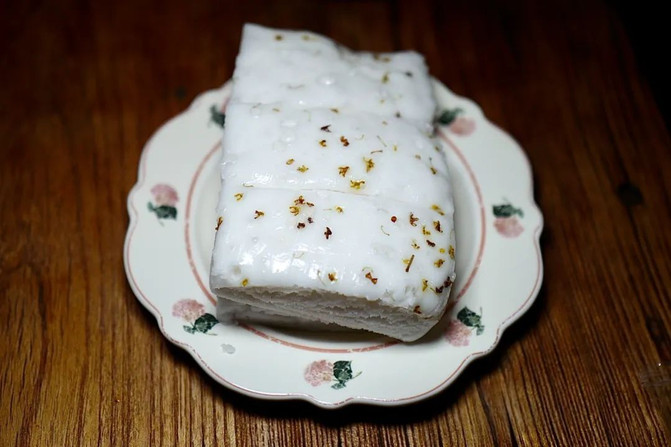
Name: Ningbo Hair Cake
Brand: Yujiuxuan·Jiangnan Pastry
This is called Ningbo Hair Cake. It is very low in sweetness. It is fermented with wine and is soft and delicious.
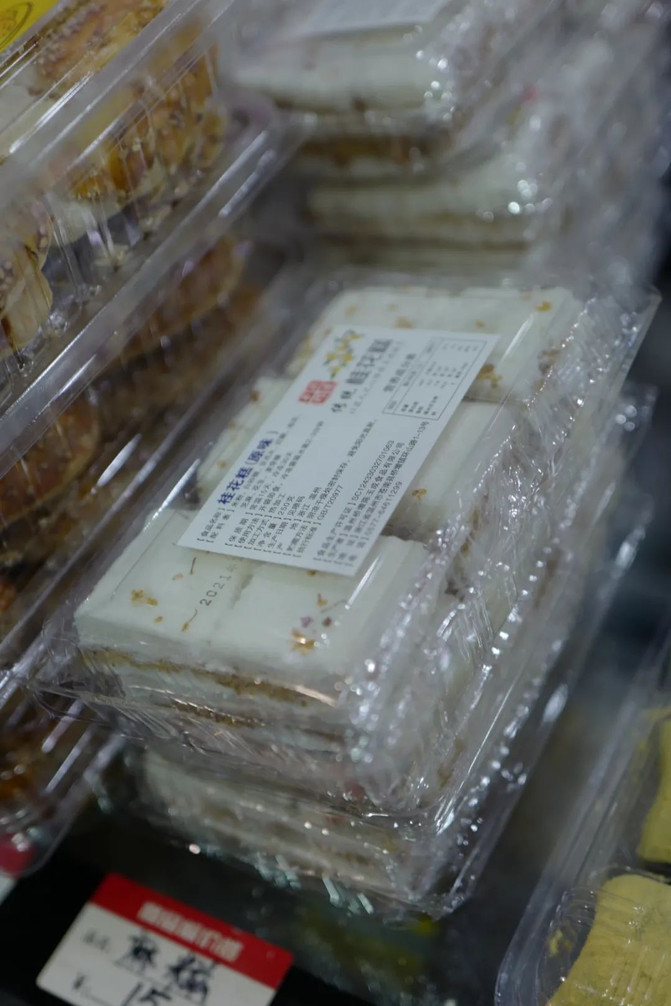
Name: Osmanthus cake
Ingredients list: rice flour, white sugar, drinking water, brown sugar, osmanthus, sesame, peanuts, maltose
Brand: Yujiuxuan·Jiangnan Pastry
The filling of this osmanthus cake contains brown sugar, peanuts, white sesame seeds, and osmanthus. It tastes a bit like cloud cake or gorgon fruit cake on the outside. It is quite chewy, soft in the middle, and the aftertaste keeps coming out of the nose.
It is close to the "Danosmanthus" recorded in Ming Gao Lian's "Zunsheng Ba Jian": picking flowers, sprinkled with licorice water, and making cakes with rice spring powder. The fragrance fills my cheeks.
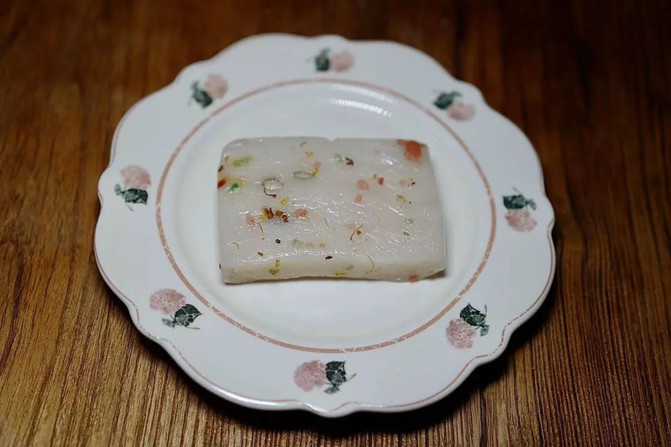
Name: Honey Cake
Ingredients list: rice flour, sugar, fruit sauce (or rose sauce)
Brand: Jiangnan Chun
This honey cake contains red and green silk, pumpkin seeds, as well as osmanthus. It is relatively low in sweetness and is classic and pleasing. And the recipe is like the Baiguo cake that Grandpa Yuan Mei likes: "Hangzhou Beiguan takeout is the best. It is better to use powder glutinous rice, with more pine nuts and walnuts, rather than diced orange. Its sweetness is neither honey nor sugar, and it can be temporary or long-term. You cannot follow the law at home."
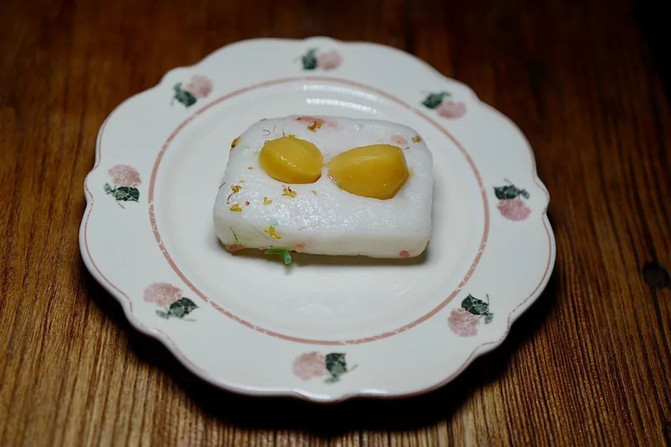
Name: Chongyang Chestnut Cake
Ingredients list: rice flour, white sugar, chestnuts, osmanthus, red and green silk
Brand: Jiangnan Chun
Chongyang Chestnut Cake is a limited version, and the boss said that he would not make it after it is finished in November. The sugar-soaked local chestnuts are the highlight, sweet. There are red, green silk and osmanthus in the cake body. The cake body inside has no sweetness. It is very suitable for the elderly and me who are trying to pretend to lose weight. In fact, this cake and the chestnut cake in "Suiyuan Food List" are extremely rotten when boiled. They are steamed with pure glutinous powder and sugar into a cake, and add melon kernels and pine nuts on top. This is a snack on Chongyang." It's a far cry!
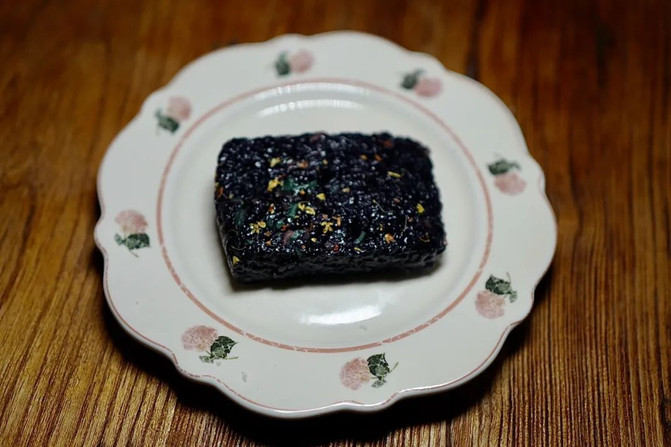
Name: Black Rice Cake
Ingredients list: glutinous rice, white sugar, sugar osmanthus, black leaf juice
Brand: Jiangnan Chun
There are red, green silk and osmanthus in the black rice cake. Black rice is actually the Qingjing rice in "Shanjia Qing Gong". The black color is dyed by southern candle leaves. It was eaten by ancient monks during their cultivation. It is also the seasonal rice during the summer solstice. Currently, due to proper preservation technology, it can be eaten all year round.
There is a romantic and worrying time in the autumn tiger in Hangzhou called "sweet-scented osmanthus steaming", also known as "sweet-scented osmanthus steaming". During this time, osmanthus flowers are in full bloom, and the house is like a yellow plum day, but it is hot outside. It is recorded in "Qing Jialu" that "the custom calls Yan Gui as wooden sweet clover. There are two types in the morning and evening. The ones that open on the autumnal equinox are called Zaosmanthus, and the ones that open on the Hanlu Festival are called Wannui. When it is about to bloom, there must be several days as hot as summer heat, which is called steaming of mellowwood."
Once you listen to this name, the wrinkles in your heart will be smoothed out.

Every morning when the "osmanthus steamed" brings dew, it is also the time when the eyes of farmers making sugar osmanthus in Hangzhou are brightest. They use bamboo poles to beat the flowers, which must be half-closed and laid before the sun comes out, otherwise the aroma will be exhausted. In order to solidify the fragrance and condense the color, the method that has been followed since ancient times is to use "plum marinade":"Marinate green plum marinade is the best. Whenever each fruit is made with sugar, add a little juice, and the fruit will not be damaged and the color will not fade." In fact, it is just the green plum that was boiled in April and May, and pickled with salt until the osmanthus blossoms. If you have a deep love for the flavor of osmanthus, you can also try "Tianxiang Soup: When the white mellowus is in full bloom, use a stick to cut the flowers with dew in the morning. Serve it with a cloth quilt, pick off the stalks and calyx, and place it in a cleaning vessel. Mash the new basin like mud, drain it dry, and put it away. Add a tael of licorice and ten salt plums to each catty, mash them into cakes, place them into jars, seal them, and order them with boiling soup."
Lin Hong said in "Shanjia Qing Gong" that the osmanthus flowers should be slightly steamed in a steamer and then dried to be used as fragrance: "Those who pick flowers, steam them slightly and dry them to make fragrance, in Yinbian wine, burn them with ancient tripods, which is especially clear." Imagine that the process of fragrant flowers takes place in this sky where water is as fragrant as immortals. It is indeed a enjoyment of smelling the fragrance of osmanthus and bathing in the osmanthus flower bath.
The thousand-year-old fragrance of sweet-scented osmanthus tea, wine and snacks in Jiangnan is actually a history of expressing love for "sweet-scented osmanthus". "Winter Melon", an old Taiwanese master who makes vinyl machines by hand, told me that to appreciate vinyl, you have to put yourself back to that era. There is no such "rustling" sound in the digital age. The precise and beautiful restoration is indeed something to be proud of, but there is also a boring side.
Forget the memories on the tip of our tongue, and we are like orphans growing up in the desert of food. Those interesting tastes of the past will exist "because of the rare and beautiful" inner connection and quietly move.
Passing by the grandma's pastry stall in the vegetable market, I would still pick the piece of cake with more osmanthus.
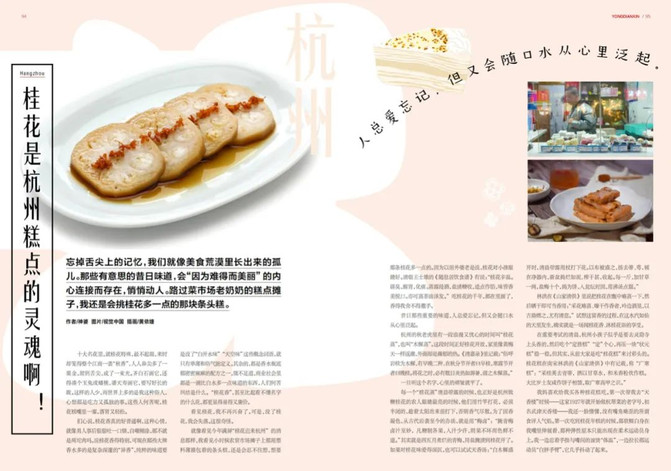
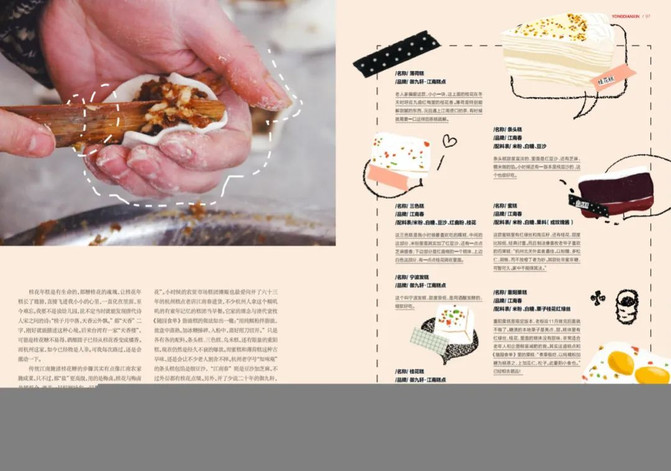
The goddess asked
What do you like to eat cinnamon flowers to refresh your heart?
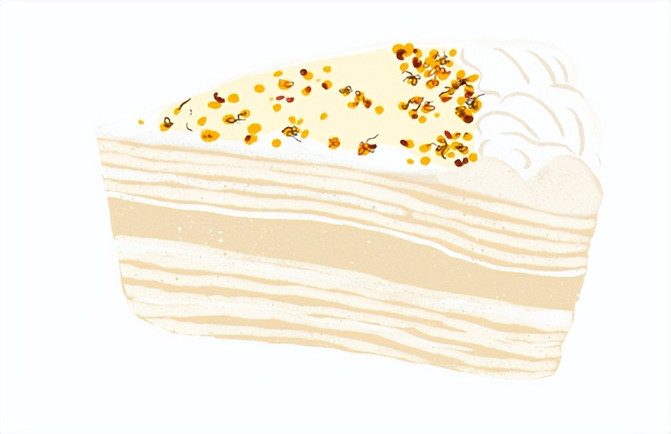
"Dull, light, yellow, soft,
The trace of emotion is far away, only the fragrance remains.
Why do you need light blue and deep red?
I am the best among flowers."
--Li Qingzhao's "Partridge Sky·Osmanthus"
Food Bless You!
Consultant for "Flavor World 3"
Owner of "God's Table"
Producer of "Food Wild China"
Previous Article:Visiting the secret realms of Jiangnan in autumn, sailing across seven miles and encountering the scenery in famous paintings
